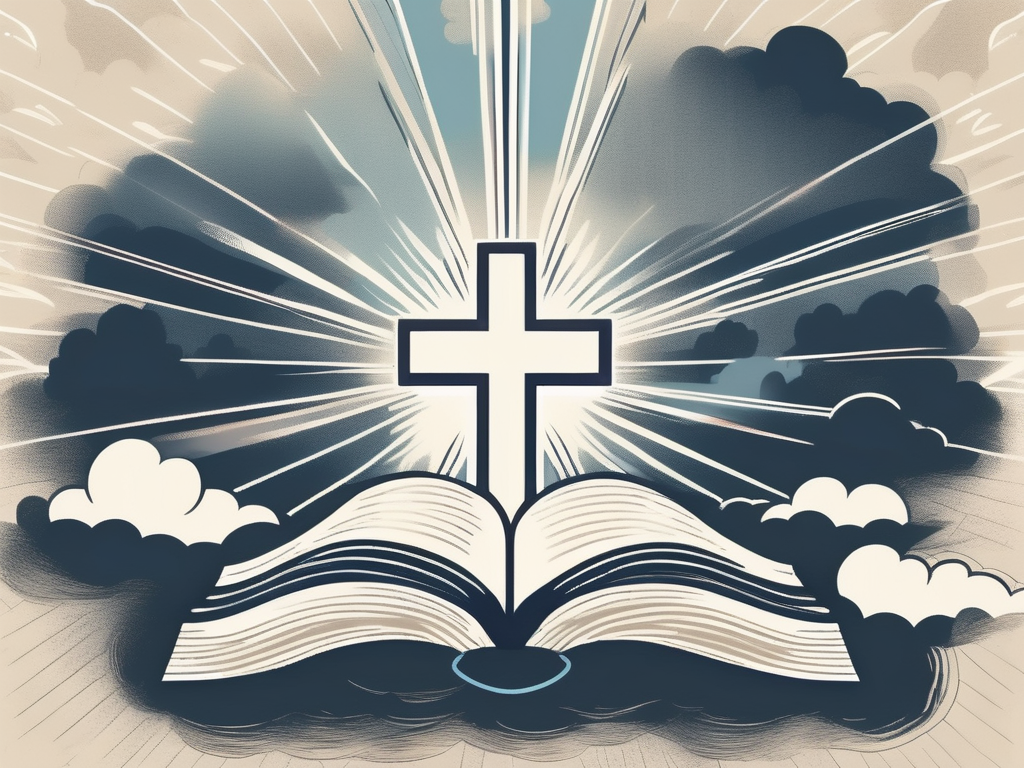Have you ever wondered when Jesus Christ will come back? Many people have speculated about the timing of the Messiah’s return, but the question remains unanswered. In this article, we will delve into the concept of the second coming, examine biblical references and theological interpretations, explore signs of the Messiah’s return, discuss debates and controversies surrounding this event, explore the impact of the belief in the second coming on Christian life, and examine its portrayal in popular culture and literature. So, let’s dive in and explore this fascinating topic together!
Understanding the Concept of the Second Coming
The second coming refers to the anticipated return of Jesus Christ to Earth. According to Christian beliefs, Jesus ascended to heaven after his resurrection and promised to return one day. This concept has been widely discussed and interpreted throughout history.
As believers eagerly await the second coming, they find solace and hope in the promise of Jesus’ return. This event holds great significance in Christianity, as it represents the fulfillment of God’s plan for redemption and the ultimate triumph of good over evil. The anticipation of this momentous event has fueled theological discussions and debates, as scholars and theologians seek to understand its implications.
Biblical References to Jesus’ Return
The Bible contains several references to Jesus’ second coming. In the New Testament, Jesus himself spoke about his return, often using parables to illustrate the importance of being prepared for his arrival. These parables, such as the parable of the ten virgins and the parable of the talents, emphasize the need for readiness and faithfulness in anticipation of the second coming.
Furthermore, the book of Revelation provides vivid and symbolic imagery associated with this event. It describes Jesus’ return on a white horse, accompanied by angels and saints, to establish his kingdom on Earth. The book presents a vision of judgment, redemption, and the restoration of all things in accordance with God’s divine plan.
Theological Interpretations of the Second Coming
Various theological interpretations exist regarding the second coming of Jesus Christ. Some believe in a literal interpretation, expecting a physical return of Jesus to Earth. These believers anticipate a visible and tangible event where Jesus will reign as the King of Kings and establish a new era of peace and righteousness.
On the other hand, some interpret the second coming metaphorically, emphasizing the spiritual transformation that will occur. They view it as a symbolic representation of the inner awakening and enlightenment that individuals can experience through their faith in Jesus Christ. This interpretation highlights the personal and transformative nature of the second coming, emphasizing the importance of spiritual growth and renewal.
Additionally, there are those who hold a more nuanced perspective, combining elements of both literal and metaphorical interpretations. They recognize the symbolic nature of the second coming while also acknowledging the potential for a physical manifestation of Jesus’ return.
The diversity of interpretations adds depth and complexity to this topic. It reflects the richness and breadth of Christian thought, as well as the profound impact that the concept of the second coming has on believers’ faith and understanding of God’s plan for humanity.
The Signs of the Messiah’s Return
Throughout history, many have attempted to decipher the signs and indicators of Jesus’ second coming. Some look to the prophecies found in the Old Testament as potential indicators. These prophecies, such as those from the book of Daniel or the Psalms, are believed to foreshadow the coming of the Messiah.
One of the most significant prophecies in the Old Testament is found in the book of Isaiah. In Isaiah 53, a suffering servant is described who will come to save humanity. This servant is believed by many to be a reference to Jesus and his sacrificial death on the cross. The detailed description of the suffering servant’s mission and the impact it will have on the world provides a foundation for understanding the signs leading to Jesus’ return.
Another prophecy that is often referenced is found in the book of Daniel. In Daniel 7:13-14, a vision of the “Son of Man” is described, who will receive authority and an everlasting kingdom. This vision is seen by many as a foreshadowing of Jesus’ second coming, where he will establish his reign over all nations.
Prophetic Indications in the Old Testament
The Old Testament contains numerous prophecies that some believe point to the second coming of Jesus. These prophecies provide a glimpse into the future and offer hope to believers who eagerly await the Messiah’s return.
One such prophecy is found in the book of Zechariah. In Zechariah 14:4, it is written, “On that day his feet shall stand on the Mount of Olives that lies before Jerusalem on the east, and the Mount of Olives shall be split in two from east to west by a very wide valley, so that one half of the Mount shall move northward, and the other half southward.” This vivid imagery suggests a dramatic event that will occur during the second coming of Jesus, with the Mount of Olives being a significant location.
Additionally, the book of Malachi contains a prophecy about the coming of Elijah before the great and dreadful day of the Lord. This prophecy is often interpreted as a precursor to the second coming of Jesus, as Elijah is believed to represent the restoration of all things before the Messiah’s arrival.
New Testament Predictions and their Meanings
In the New Testament, Jesus himself shared predictions related to his return. He spoke of wars, famines, and natural disasters as signs of the end times. These predictions have been interpreted and analyzed by scholars and theologians to gain insight into the imminent return of the Messiah.
In Matthew 24, Jesus delivers a detailed discourse known as the Olivet Discourse, where he describes the signs that will precede his second coming. He warns of false messiahs, wars and rumors of wars, famines, earthquakes, and persecution of believers. These signs, Jesus explains, are like birth pains, increasing in intensity as the time of his return draws near.
Another significant prediction is found in the book of Revelation. This apocalyptic book is filled with vivid imagery and symbolic language, describing the events leading up to and following the second coming of Jesus. The book speaks of a great battle between good and evil, the defeat of Satan, and the establishment of a new heaven and earth.
As believers continue to study and interpret these prophecies and predictions, they seek to discern the signs of the Messiah’s return. While there may be differing interpretations, the common thread is the anticipation and hope for the fulfillment of God’s promises and the ultimate redemption of humanity.
Debates and Controversies Surrounding the Second Coming
The concept of the second coming has sparked debates and controversies among different Christian denominations and scholars. Each group has its own unique interpretation, leading to varied perspectives on this topic.
As the anticipation of the second coming continues to captivate the minds and hearts of believers, it is important to delve deeper into the different views and opinions that exist within Christianity.
Different Christian Denominations’ Views
Within Christianity, different denominations hold differing views on the nature and timing of the second coming. Some emphasize the rapture, a belief in the physical removal of believers before a period of tribulation, while others focus on the establishment of Christ’s kingdom on Earth. These differences in interpretation reflect the rich diversity within Christianity.
For instance, some denominations, such as the Dispensationalists, believe in a pre-tribulation rapture, where believers will be taken up to heaven before a time of great tribulation on Earth. On the other hand, other denominations, like the Postmillennialists, believe that the second coming will occur after a period of spiritual and societal transformation, where the kingdom of God will be established on Earth.
These contrasting views have led to passionate debates and discussions among theologians and believers, each presenting their own scriptural evidence and theological reasoning to support their stance. The diversity of interpretations within Christianity adds depth and complexity to the ongoing dialogue surrounding the second coming.
Scholarly Opinions on the Anticipated Return
Scholars and theologians have also contributed to the debates surrounding the second coming. Their academic perspectives bring a different dimension to the discussion, often considering historical, cultural, and literary contexts.
Some scholars view the second coming as a historical event, examining the biblical texts and historical records to understand the possible fulfillment of prophecies. They analyze the socio-political climate of the time, seeking to unravel the intricate connections between biblical passages and real-world events.
On the other hand, there are scholars who approach the second coming as a symbolic representation of social and spiritual transformation. They explore the metaphorical language used in the biblical texts, interpreting the second coming as a call for believers to actively participate in bringing about positive change in the world.
These varying opinions among scholars highlight the complexity and depth of this theological discussion. The second coming is not merely a topic of religious belief, but a subject of intellectual inquiry and exploration.
As debates and controversies persist, it is crucial to approach the topic of the second coming with open minds and hearts, recognizing the diversity of interpretations and the rich tapestry of perspectives that exist within Christianity. The ongoing dialogue surrounding the second coming continues to shape and challenge our understanding of this profound and mysterious event.
The Impact of the Second Coming Belief on Christian Life
The belief in the second coming has significant implications for the lives of Christians. It influences their worship practices, rituals, and shapes their moral and ethical conduct.
One of the profound ways in which the belief in the second coming impacts the lives of Christians is through its influence on worship and rituals. This belief often encourages Christians to focus on preparing themselves spiritually for the return of Jesus. It inspires acts of worship, such as prayer, meditation, and participating in religious rituals that deepen their connection with God. The anticipation of Jesus’ return creates a sense of urgency and devotion in their worship, as they seek to align their lives with the teachings of Christ.
Furthermore, the belief in the second coming may also influence the liturgical calendar observed by different Christian denominations. Specific seasons or periods of the year may be dedicated to reflecting on the second coming, allowing believers to engage in a more focused and intentional exploration of this aspect of their faith. These dedicated seasons provide opportunities for Christians to delve deeper into the theological significance of the second coming and its implications for their lives.
However, the impact of the belief in the second coming extends beyond worship and rituals. It plays a crucial role in shaping the moral and ethical conduct of Christians. The anticipation of Jesus’ return motivates believers to live righteous and virtuous lives. They strive to follow the teachings of Jesus, love one another, and work for justice and peace in the world.
This belief acts as a moral compass, guiding their actions and decisions. It reminds Christians of the ultimate accountability they will face when Jesus returns, prompting them to live with integrity and compassion. The belief in the second coming encourages believers to prioritize their relationships with God and others, fostering a sense of responsibility and care towards their fellow human beings.
Moreover, the belief in the second coming instills hope and resilience in the face of adversity. Christians find solace in the knowledge that Jesus will return to establish a new heaven and earth, free from pain, suffering, and injustice. This hope empowers them to persevere through challenging times, trusting in God’s ultimate plan for restoration and redemption.
In conclusion, the belief in the second coming has a profound impact on the lives of Christians. It influences their worship practices, rituals, and shapes their moral and ethical conduct. This belief inspires acts of devotion, encourages reflection on the theological significance of Jesus’ return, and guides believers in living righteous lives. It provides hope and resilience in the face of adversity, reminding Christians of the ultimate fulfillment of God’s promises.
The Second Coming in Popular Culture and Literature
The concept of the second coming has not only been a part of theological discussions but has also found its way into popular culture and literature. It has been depicted in various forms of art, including films, books, and music.
Depictions of the Messiah’s Return in Films and Books
The second coming has been a recurring theme in numerous films and books, exploring its impact on individuals and society. These portrayals range from apocalyptic scenarios to stories of personal redemption and spiritual transformation. Whether dramatized or metaphorically represented, these depictions capture the imagination and invite reflection.
The Second Coming in Art and Music
Art and music have also been mediums for expressing the concept of the second coming. Paintings, sculptures, and musical compositions have sought to capture the essence and significance of this anticipated event. From classical pieces to contemporary works, artists use their creativity to inspire contemplation and awe.
In conclusion, the question of when Jesus Christ will come back remains unanswered. The concept of the second coming is a deeply rooted belief within Christianity, continually inspiring contemplation and debate. Through biblical references, theological interpretations, signs, debates, and its impact on Christian life and popular culture, this belief continues to shape the lives and thoughts of many believers. As we reflect on this topic, let us remember that the ultimate significance lies not in predicting the timing, but in living faithfully and preparing our hearts for the return of Jesus Christ.












